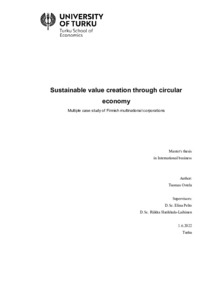Sustainable value creation through circular economy : Multiple case study of Finnish multinational corporations
Ostela, Tuomas (2022-06-02)
Sustainable value creation through circular economy : Multiple case study of Finnish multinational corporations
Ostela, Tuomas
(02.06.2022)
Julkaisu on tekijänoikeussäännösten alainen. Teosta voi lukea ja tulostaa henkilökohtaista käyttöä varten. Käyttö kaupallisiin tarkoituksiin on kielletty.
avoin
Julkaisun pysyvä osoite on:
https://urn.fi/URN:NBN:fi-fe2022061045766
https://urn.fi/URN:NBN:fi-fe2022061045766
Tiivistelmä
Increasing global consumerism has significantly strained Earth’s natural resources. This depletion of raw material has created a need for sustainability, a need to change the perspective of businesses from economic lead shareholder view to sustainable stakeholder view in order to balance the economic, social and environmental elements so that one is not pursued at the cost of others. This study focuses on circular economy, which is one of the solutions to introduce sustainability to business. The purpose of this study is to identify how circular economy business models create sustainable value and how this is noticeable in the activities of Finnish multinational companies. A circular business model is a way to create value by using circular business actions of regenerate, share, loop, optimize, virtualize and exchange. This study used a qualitative case study approach, where secondary data was gathered from official sustainability reports and analysed by deductive structural coding. The chosen coding categories were derived from theory, and they were used to analyse the case companies’ circular business models. The case companies chosen for this study were Kone, Kesko, Neste and Metso Outotec. The theoretical framework presented 26 circular business models and 6 circular business action that those circular models use to create sustainable value. Several circular business models were identified from all of the case companies and some mainly industry related differences discovered. This study concluded that even though the verification of any value created of being fully sustainable is problematic, it can be argued that the circular business models create sustainable value by not clearly reducing the other two value forms when creating one. Furthermore, the sustainable value form circular business models create the most is environmental value. Future studies focusing on companies that are based in different countries could add to the practical implementation of circular business model in companies and a study that would include and compare companies that are different in size could also produce useful information as the process of creating a unifiable implementation strategy for sustainable development into business is still ongoing.
